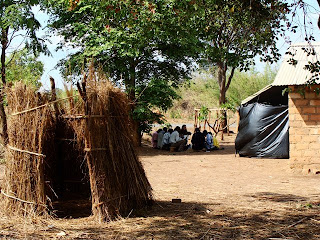As I think this will be my last post, I'm going to list my top ten points of being in Zambia:
1. The weather - blue sky every day until October.
2. The people. - Very friendly, happy and welcoming people.
3. Drive through green grocers on many main roads - Just buy your fruit and veg while in the car.
4. The many kinds of fruit that can be grown here.
5. Lorry drivers indicating if it's safe to overtake them or not
6. Double-decker shopping trolleys in the supermarket.
7. Plastic paper plate holders (not seen them in UK anyway!)
8. Game reserves full of great wildlife
9. Being able to hitch lifts on lorries (and generally get as many people on the truck as possible!)
10. .... well OK, maybe I can't think of 10 things, but 9 is good!
Well, it's the end of my Zambian adventure, and I was kept on my toes right until the end as you'll read further on. I'm in Tanzania now, visiting my friends Neal and Sarah. I had hoped to take the train there, which takes around 2 days (if it doesnt derail - which is a common problem!) to get from Kapiri Mopshi in Zambia to Dar es Salaam. However, you have to have a visa before you travel, which can only be obtained from Lusaka and so in the end this was too difficult to arrange. If you fly, you can just purchase a visa on arrival. So it came to be that I was sat in Ndola airport departure lounge waiting for my plane, when a plane came too close to the building and the wind created by the propeller engines ended up blowing the windows through. Big chunks of glass just missed me by inches, and stuck into a wooden table. I was fortunate that it was not my body instead, which would have been the case if I'd been sitting in the seat to my right. Close shave, but I guess those prayers for safe travel also included just being in the airport itself! Slightly shaken I boarded the plane 15 minutes later. Nobody from the airport staff came to see if I was ok, but plenty of passengers came over and help take shards of glass from my hair and clothes! Anyway I'll write to Zambian airways and see if I can get any compensation, or at least get the pilot a severe warning for his crazy antics! I think he'll probably get some sort of a warning given the fact that the departure lounge was wrecked, and they'll have to replace a lot of glass.
So that's all from this Zambian adventure. Thanks for reading, and I hope you enjoyed hearing about the adventure over the past few months. I look forward to catching up with you soon.













